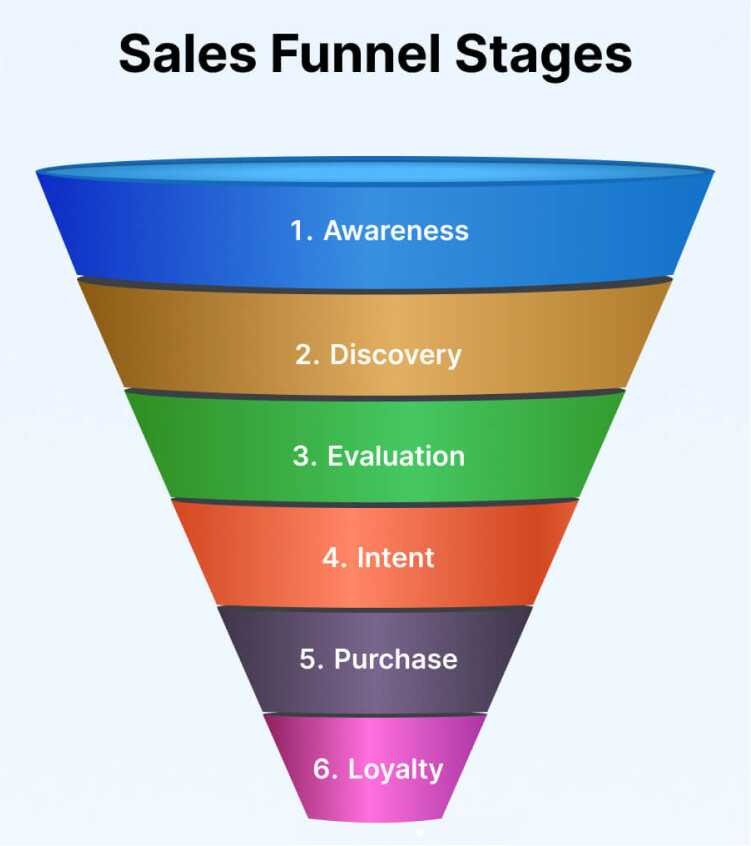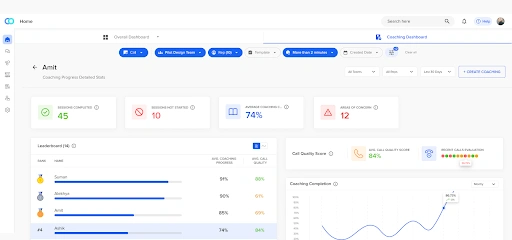Mastering sales funnel management ensures a steady stream of leads and higher conversions. These 10 tips streamline your process, boost efficiency, and unlock real benefits. With tools like Convin, you can level up your funnel strategy and maximize every opportunity. Ready to take your sales funnel management to the next level?
Upgrade your sales funnel management workflow.
What is Sales Funnel Management?
Sales funnel management is the process of organizing, monitoring, and optimizing each stage of the sales funnel to ensure leads are consistently moving toward conversion. It involves tracking prospects from the awareness stage all the way to closing the deal, ensuring no opportunity is lost along the way.
Effective sales funnel management helps sales teams identify bottlenecks, improve communication strategies, prioritize high-intent leads, and ultimately increase conversions. By streamlining this process, businesses can maintain a steady flow of qualified leads and close deals more efficiently.
These stages typically include awareness, interest, consideration, intent, evaluation, and purchase. Sales funnel management involves guiding prospects through these stages and optimising each step to maximise conversions.
What are the Sales Funnel Stages?
Understanding the stages of the sales funnel is like having a roadmap to guide your leads from initial awareness to becoming loyal customers.
Let's explore the stages of a sales funnel in depth.

Caption/Alt-text: Stages of Customer Support Sales Funnel
1. Awareness Stage
- Sales Funnel Management: At this initial stage, the goal is to raise awareness about your product or service. Utilise various marketing channels and strategies to attract potential leads.
- Sales Funnel Strategy: Develop content that addresses the pain points of your target audience, such as blog posts, social media posts, and informative videos.
- Sales Funnel Examples: Examples of awareness stage content include educational blog articles, engaging social media posts, and attention-grabbing videos.
2. Interest Stage
- Sales Funnel Management: Once you've captured the audience's attention, it's time to nurture their interest. Provide more detailed information about your offerings to pique their curiosity.
- Sales Funnel Strategy: Create informative webinars, eBooks, or case studies that showcase the value of your product or service.
- Sales Funnel Examples: Interest stage content can include webinar registrations, eBook downloads, or interactive quizzes.
3. Consideration Stage
- Sales Funnel Management: In this phase, leads are actively evaluating your solution against competitors. Offer in-depth information and solutions to address their specific needs.
- Sales Funnel Strategy: Implement lead scoring to prioritize high-value leads and provide personalized content, such as product demos and free consultations.
- Sales Funnel Examples: Content might include product comparison guides, demo requests, or pricing calculators.
4. Intent Stage
- Sales Funnel Management: Leads in the intent stage have shown a clear intention to purchase. Now, it's essential to guide them towards the final decision.
- Sales Funnel Strategy: Utilize marketing automation and targeted email campaigns to keep leads engaged and informed.
- Sales Funnel Examples: Content may include personalized email sequences, free trials, or discount offers.
5. Evaluation Stage
- Sales Funnel Management: Prospects in this stage are evaluating the specifics of your offering. Provide detailed information, answer questions, and address objections.
- Sales Funnel Strategy: Offer case studies, customer testimonials, and live product demonstrations to showcase the effectiveness of your solution.
- Sales Funnel Examples: Evaluation stage content includes case study downloads, live product webinars, and direct communication with sales representatives.
6. Purchase Stage
- Sales Funnel Management: This is the final stage where leads become paying customers. Ensure a seamless buying process and provide excellent customer support.
- Sales Funnel Strategy: Optimize your checkout process and implement post-purchase surveys or follow-ups to gather feedback.
- Sales Funnel Examples: Purchase stage actions involve completing a purchase, subscribing to a service, or signing a contract.
7. Post-Purchase Stage
- Sales Funnel Management: Sales funnel management doesn't end with a purchase. Focus on customer retention and satisfaction.
- Sales Funnel Strategy: Send thank-you emails, offer loyalty programs, and request reviews or referrals from satisfied customers.
- Sales Funnel Examples: Post-purchase content includes loyalty rewards, customer feedback surveys, and referral program invitations.
8. Advocacy Stage
- Sales Funnel Management: Encourage happy customers to become brand advocates who refer new leads to your sales funnel.
- Sales Funnel Strategy: Reward loyal customers for referrals and provide them with resources to promote your brand.
- Sales Funnel Examples: Advocacy stage activities involve referral rewards, social media sharing, and testimonials from satisfied customers.
To effectively manage your sales funnel, consider utilizing sales funnel management tools and CRM systems to track lead progression, segment your audience, and automate certain marketing tasks. These tools play a crucial role in ensuring that leads flow smoothly through each stage, ultimately resulting in increased conversions and long-term customer relationships.
Now that we've clearly understood the sales funnel stages let's explore ten actionable tips that will help you effectively manage your sales funnel and keep those leads flowing seamlessly.
What are the Sales Funnel Stages?
Understanding the stages of sales funnel is like having a roadmap to guide your leads from initial awareness to becoming loyal customers.
Let's explore the stages of a sales funnel in depth.
1. Awareness Stage
- Sales Funnel Management: At this initial stage, the goal is to raise awareness about your product or service. Utilize various marketing channels and strategies to attract potential leads.
- Sales Funnel Strategy: Develop content that addresses the pain points of your target audience, such as blog posts, social media posts, and informative videos.
- Sales Funnel Examples: Examples of awareness stage content include educational blog articles, engaging social media posts, and attention-grabbing videos.
2. Interest Stage
- Sales Funnel Management: Once you've captured the audience's attention, it's time to nurture their interest. Provide more detailed information about your offerings to pique their curiosity.
- Sales Funnel Strategy: Create informative webinars, eBooks, or case studies that showcase the value of your product or service.
- Sales Funnel Examples: Interest stage content can include webinar registrations, eBook downloads, or interactive quizzes.
3. Consideration Stage
- Sales Funnel Management: In this phase, leads are actively evaluating your solution against competitors. Offer in-depth information and solutions to address their specific needs.
- Sales Funnel Strategy: Implement lead scoring to prioritize high-value leads and provide personalized content, such as product demos and free consultations.
- Sales Funnel Examples: Content might include product comparison guides, demo requests, or pricing calculators.
4. Intent Stage
- Sales Funnel Management: Leads in the intent stage have shown a clear intention to purchase. Now, it's essential to guide them towards the final decision.
- Sales Funnel Strategy: Utilize marketing automation and targeted email campaigns to keep leads engaged and informed.
- Sales Funnel Examples: Content may include personalized email sequences, free trials, or discount offers.
5. Evaluation Stage
- Sales Funnel Management: Prospects in this stage are evaluating the specifics of your offering. Provide detailed information, answer questions, and address objections.
- Sales Funnel Strategy: Offer case studies, customer testimonials, and live product demonstrations to showcase the effectiveness of your solution.
- Sales Funnel Examples: Evaluation stage content includes case study downloads, live product webinars, and direct communication with sales representatives.
6. Purchase Stage
- Sales Funnel Management: This is the final stage where leads become paying customers. Ensure a seamless buying process and provide excellent customer support.
- Sales Funnel Strategy: Optimize your checkout process, ensure smooth retail payment processing, and implement post-purchase surveys or follow-ups to gather feedback.
- Sales Funnel Examples: Purchase stage actions involve completing a purchase, subscribing to a service, or signing a contract.
7. Post-Purchase Stage
- Sales Funnel Management: Sales funnel management doesn't end with a purchase. Focus on customer retention and satisfaction.
- Sales Funnel Strategy: Send thank-you emails, offer loyalty programs, and request reviews or referrals from satisfied customers.
- Sales Funnel Examples: Post-purchase content includes loyalty rewards, customer feedback surveys, and referral program invitations.
8. Advocacy Stage
- Sales Funnel Management: Encourage happy customers to become brand advocates who refer new leads to your sales funnel.
- Sales Funnel Strategy: Reward loyal customers for referrals and provide them with resources to promote your brand.
- Sales Funnel Examples: Advocacy stage activities involve referral rewards, social media sharing, and testimonials from satisfied customers.
To effectively manage your sales funnel, consider utilizing sales funnel management tools and CRM systems to track lead progression, segment your audience, and automate certain marketing tasks. These tools play a crucial role in ensuring that leads flow smoothly through each stage, ultimately resulting in increased conversions and long-term customer relationships.
Now that we've clearly understood the sales funnel stages let's explore ten actionable tips that will help you effectively manage your sales funnel and keep those leads flowing seamlessly.
Map your funnel for better results.
This blog is just the start.
Unlock the power of Convin’s AI with a live demo.

10 Tips to Keep Leads Flowing with Sales Funnel Management
Effective sales funnel management is essential for driving conversions and maximizing the return on investment for your business. By focusing on sales funnel stages, utilizing sales funnel management tools, and analyzing sales funnel examples, you can create a robust strategy that keeps leads flowing smoothly.
.webp)
Unlock the potential of your sales funnel with these ten invaluable tips to keep leads flowing seamlessly and optimize your sales funnel management strategy.
1. Know Your Audience: Understanding your target audience's needs and preferences is crucial. Tailor your sales funnel strategy to address their pain points and provide solutions that resonate with them.
2. Create Compelling Content: Develop engaging and informative content at each stage of the funnel. This can include blog posts, videos, webinars, and downloadable resources.
3. Implement Lead Scoring: Assign scores to leads based on their level of engagement and interest. Focus your efforts on nurturing high-scoring leads to increase conversion rates.
4. Use Email Marketing: Email is a powerful tool for nurturing leads. Send personalized and relevant emails to keep leads engaged and informed about your products or services.
5. Leverage Automation: Utilize sales funnel management tools and automation software to streamline and optimize your processes. This can include CRM (Customer Relationship Management) software and marketing automation platforms.
6 A/B Testing: Continuously test different elements of your sales funnel, such as headlines, call-to-action buttons, and email subject lines, to identify what works best for your audience.
7. Offer Incentives: Provide incentives like discounts, free trials, or exclusive content to encourage leads to take the next step in the funnel.
8. Provide Exceptional Customer Support: A positive customer experience can turn leads into loyal customers. Be responsive and helpful at every stage of the sales funnel.
9. Analyze Data: Regularly analyze data and metrics to assess the performance of your sales funnel. Identify bottlenecks and areas that need improvement.
10. Retargeting: Implement retargeting campaigns to re-engage leads who may have dropped off from the funnel. Display ads and personalized content to bring them back into the conversion process.
Now that we've explored the essential 10 tips for keeping your leads flowing smoothly through the sales funnel let's delve into the rewarding outcomes of implementing these strategies. Discover the compelling benefits of effective sales funnel management in the next section.
Convert more with smarter funnel tips.
What are the Benefits of Implementing the 10 Tips for Effective Sales Funnel Management?
Effective sales funnel management is the cornerstone of any successful sales and marketing strategy. By implementing the following ten tips, businesses can reap a multitude of benefits that enhance their sales funnel management efforts and drive greater revenue and customer satisfaction.
1. Increased Conversions
- Targeted and personalized content, along with lead nurturing, significantly increases the likelihood of converting prospects into customers.
- Carefully crafted sales funnel stages guide leads seamlessly toward the final conversion, reducing drop-offs along the way.

2. Improved Efficiency
- Automation tools and software streamline repetitive tasks, allowing your sales and marketing teams to focus on high-value activities.
- Data analysis identifies bottlenecks and areas for improvement, optimizing resource allocation.
3. Enhanced Customer Engagement
- Personalized content resonates with leads, fostering a deeper connection and trust.
- Timely responses and ongoing communication throughout the funnel stages build stronger relationships with potential customers.
4. Better Return on Investment (ROI)
- Lead scoring ensures resources are allocated to prospects with the highest potential for conversion, maximizing ROI.
- Targeted marketing efforts reduce wasteful spending on unqualified leads.
5. Clearer Strategy
- A well-structured sales funnel provides a clear roadmap for your sales and marketing teams, aligning their efforts toward a common goal.
- Data-driven insights enable continuous refinement of the sales funnel strategy, adapting to changing market conditions and customer behavior.
6. Consistent Customer Experience
- A well-managed sales funnel ensures a consistent and positive customer experience at every touchpoint, enhancing your brand's reputation.
- Timely and relevant communications demonstrate professionalism and reliability.
7. Effective Resource Allocation
- By focusing on high-potential leads, you allocate resources more efficiently, preventing wasted effort on uninterested or unqualified prospects.
- Sales funnel management tools assist in tracking and managing resource allocation.
8. Reduced Sales Cycle Length
- Efficiently moving leads through the funnel shortens the sales cycle, allowing for quicker revenue generation.
- A well-managed funnel minimizes the time prospects spend in the decision-making stages.
Suggested Read:- Explore the steps for an effective sales cycle!
9. Enhanced Customer Retention
- Post-purchase nurturing and follow-up within the sales funnel stages can turn one-time buyers into repeat customers.
- Loyal customers are more likely to refer others, contributing to long-term business growth.
10. Competitive Advantage
- Effective sales funnel management gives your business a competitive edge by maximizing the efficiency and effectiveness of your sales process.
- Businesses that excel in guiding leads through the funnel are more likely to outperform their competitors.
Implementing these ten tips for sales funnel management can lead to a plethora of benefits, including higher conversion rates, improved efficiency, enhanced customer engagement, better ROI, and a competitive advantage in the market. By focusing on each stage of the sales funnel and utilizing the right sales funnel management tools, businesses can create a well-oiled sales machine that consistently delivers results.
Improve funnel health with Convin.
How Convin Helps You Boost Your Existing Sales Funnel?
Convin offers a range of products and services that can assist in setting up and optimizing a customer support sales funnel and reduce the time of the sales cycle.
1. Automated Agent Coaching

Our Automated Coaching Platform is a unique product tailored for call center environments. This platform provides personalized and automated coaching sessions to agents, helping them develop resilience and better manage stress.
2. Lead Qualification
Chatbots can assist in qualifying leads by asking relevant questions and gathering essential customer information. Integrating insights from a company dataset ensures that lead qualification is backed by accurate, up-to-date business intelligence, allowing for more precise segmentation and targeting. This helps in segmenting leads effectively and tailoring support accordingly.
3. Multi-Channel Support
- Convin ensures that its products seamlessly integrate with various communication channels, including phone calls, live chats, and emails.
- This enables call centers to gain a holistic view of customer interactions across all touchpoints, enhancing the omnichannel customer experience.

Convin's suite of products and services can be instrumental in setting up, managing, and optimizing a customer support sales funnel. From automating initial interactions to providing personalized support and valuable insights, Convin can enhance the efficiency and effectiveness of your customer support and sales efforts.
Book your Convin demo today!
FAQ
1. How do you manage sales funnel?
Managing a sales funnel involves guiding prospects through various stages, from awareness to conversion, using strategies and tools to optimize lead generation, nurturing, and closing deals.
2. Is a sales funnel a CRM
A sales funnel is not a CRM (Customer Relationship Management) system; it's a visual representation of the customer journey, while CRM is software used for managing customer interactions and data.
3. What is a sales funnel?
A sales funnel is a visual representation of the customer journey, divided into stages, to track and optimize the process of turning prospects into customers.
4. Do sales funnels really work?
Sales funnels can be effective when properly implemented, as they provide a structured approach to lead management and conversion, but success depends on strategy and execution.
5. What are the KPI stages of the funnel?
Key Performance Indicator (KPI) stages of the funnel typically include Awareness, Interest, Consideration, Intent, Evaluation, and Purchase, with metrics like conversion rates, lead quality, and sales velocity measured at each stage.




%20BLOG10%20examples%20of%20artificial%20intelligence%20in%202024.webp)




.avif)